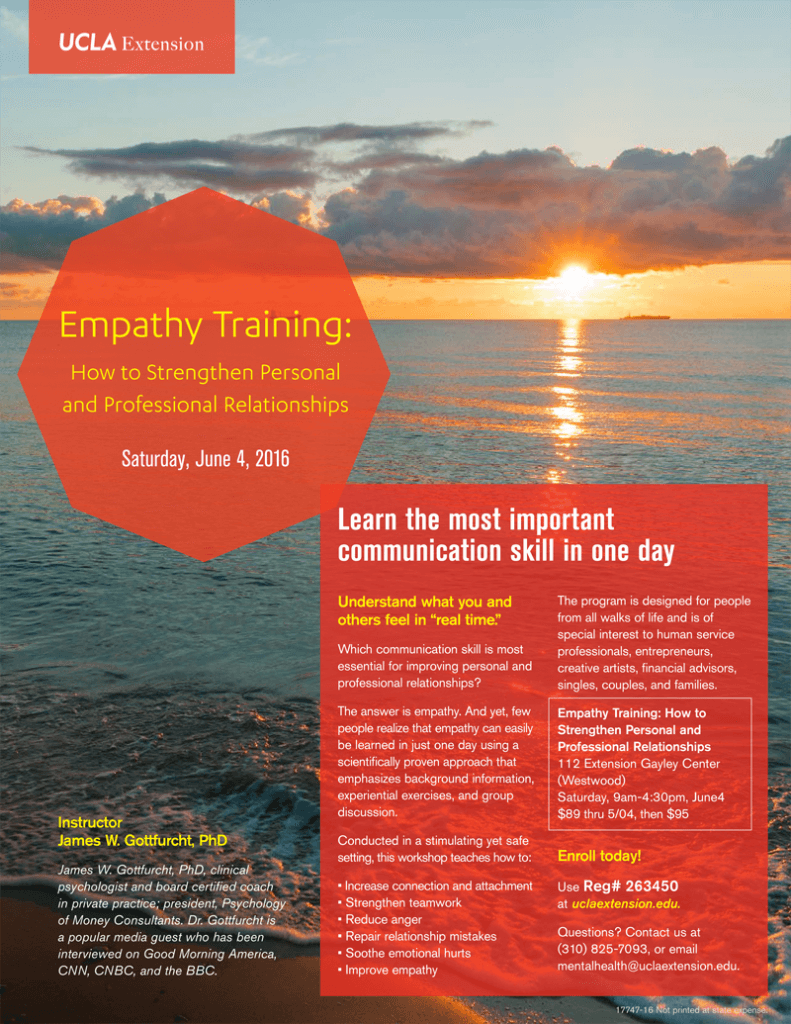



Significant Returns for Full Empathy over Partial Empathy
For those of you who may not know, ROI stands for return on investment. In the financial world, this means what percent you make on the money you invest. For example, if you buy a stock for $100 and sell it for $110, your ROI would be 10%. With Psychology of Money, we use certain financial terms like ROI as a metaphor. ROI can represent how much benefit you will receive from the couple of minutes you spend reading this Newsletter. If you apply what you read today and in our next issue, we believe you will have a significant ROI – both with money and relationships.
Full Empathy is the foundation of emotional intimacy and great mentoring, therapy, parenting and other types of helping relationships. By Full Empathy, we mean “to experience another’s inner world, what he or she expresses (verbally and nonverbally), understand it and authentically communicate back its essence.” Full Empathy is most beneficial to offer to people who feel sad, anxious, angry, frustrated or otherwise distressed. These emotions are often uncomfortable for the person to experience.

We want to clarify the difference between Full Empathy and four other ways of communicating that people often confuse with Full Empathy. We call these four other ways “Partial Empathy”. We have our own definitions of them. They are:
To help illustrate the differences between Partial Empathy and Full Empathy, we will use a brief vignette between you and a friend. Let’s start with what a Full Empathy response would look like, and see how well you think most people would connect with that.
Friend: “I’ve really been feeling stressed lately… It was hard to get through the holidays after losing my mom. And now, I realize I’ve fallen so far behind with my business. I’m not sure how I’ll manage.”
You: “It sounds like you’ve felt stressed out while going through the holidays without your mom. Now that you’ve dealt with that, you sound concerned about your business and how you will catch up.”
This response would likely be felt by your friend as empathic. It mirrors back the important feelings and situational stressors your friend shared and shows you have a clear understanding of the essence of his or her message.
In contrast, let's look at what Partial Empathy responses would be like. First we will define each type for you, and then we'll apply it to the scenario described above.
Sympathy is “expressing your own feelings for another person, but not necessarily experiencing his or her actual feelings.” You can feel sorrow or compassion for someone else’s pain, but not necessarily experience the uniqueness of his or her feelings or mirror them back accurately. Sometimes sympathy reaches people, and sometimes it may be received as condescending or hollow.
A sympathetic response might sound like: “I’m sorry you’re feeling so stressed with losing your mom and running your business.”
Mechanical Mirroring is “to mirror or parrot back what someone says as a technique or intellectual exercise without truly connecting to his or her inner world.” Some people might find this helpful while for others, it may come across as shallow, repetitive or patronizing. This could decrease understanding and connection.
A mechanical mirroring response might be like: “You’ve been really stressed lately. It was hard to get through the holidays after losing your mom. And now that you’ve fallen behind with running your business, you’re not sure how you’ll manage.”
Do you want to learn how to increase your empathy significantly in one day?
Thursday’s Blog will explore the differences between Over-identification and Projection, summarize the advantages of offering Full Empathy over Partial Empathy and conclude with why empathy is crucial to increasing your financial success.
If you have any comments, stories or opinions, we would love to hear them – please email us at psychmoney@aol.com.
Feel free to forward this email to any interested parties.
Since the 1970s, Psychology of Money has been a leader in helping men, women and families to improve their empathy, emotional intimacy and communication along with their mindset toward money, financial success and family legacy.
Search for

Recent Posts